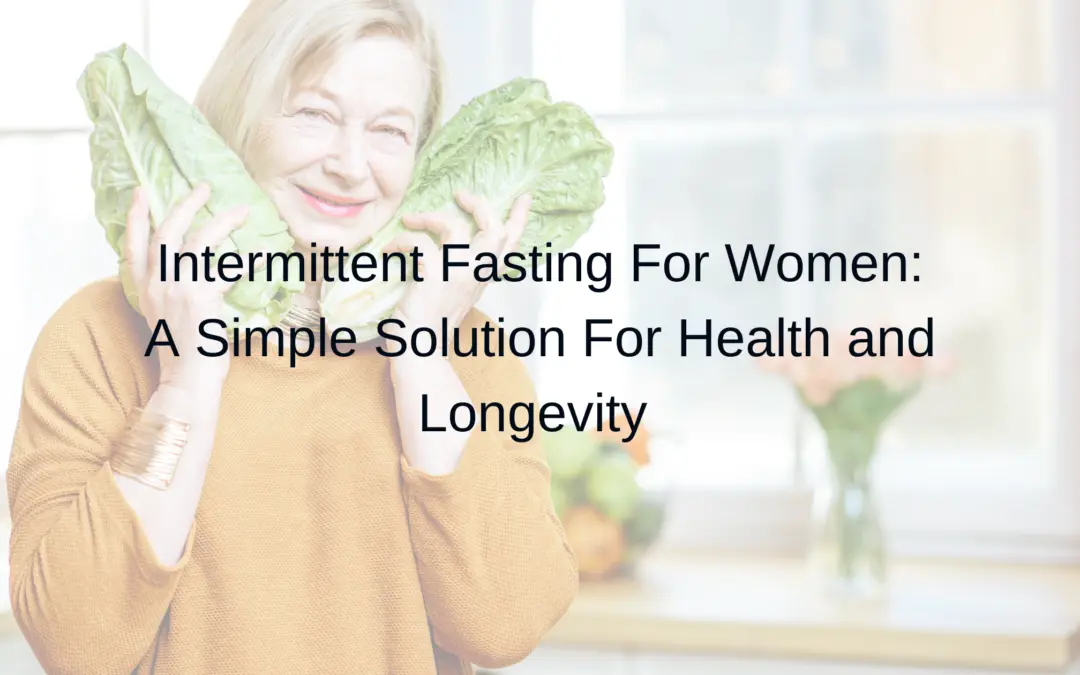For centuries, people have sought ways to live long, healthy lives. Ancient people looked for the rumored fountain of youth – magical waters that would help them retain the vibrance of youthfulness as they aged.
Mark Twain once wrote, “Life would be infinitely happier if we could only be born at the age of 80 and gradually approach 18.” How wonderful would it be to have the wisdom and knowledge of an eighty-year-old contained in the body of an eighteen-year-old!
In modern times, we’ve looked to science for the answers on aging gracefully. Little did we know that the ancient practice of fasting was the answer all along. Science is catching up to what Hippocrates believed: that the body can heal itself through fasting.
Today, scientific evidence and the discovery of autophagy are changing the landscape of intermittent fasting. Intermittent fasting is becoming more popular day by day. And many women are jumping on board, hoping it will be the answer they’ve been looking for.
Can intermittent fasting help women live longer, healthier lives?
In this article, we’ll review what we know about intermittent fasting and how it can help you enjoy excellent health and quality of life as you age.
Intermittent Fasting for Women is Simple: Fast. Feast. Repeat.
Intermittent fasting is a simple plan. It’s as simple as fast, feast, repeat. It’s also the natural rhythm of your body. When you sleep, you’re fasting. When you’re awake, you feast. Intermittent fasting is a cycle where you move between periods of fasting and periods of normal eating each day.
When you practice intermittent fasting, you allow your body to obtain the nutrients it needs, digest and disseminate those nutrients, then rest. While you’re fasting, your body breaks down and recycles old cells and materials. This is called autophagy. It’s your personal repair shop.
Intermittent fasting places a small stress on your body – called hormetic stress. This beneficial stress allows your body to adapt and become stronger. Studies show that when you place mild stress on your body, you can lessen the occurrence and severity of disease while extending your lifespan.
For instance, when you lift weights you create stress on your muscles. The stress you put on your muscle by lifting the weight repeatedly creates micro-tears in the muscle. Your muscle then begins to heal those micro-tears and in the process, it creates a stronger muscle.
This is similar to intermittent fasting. When you fast, your body goes through a repair process of breaking down old proteins and worn-out cells, recycling what it can, and repairing the rest. Simply by balancing the number of hours you feast with the number of hours you fast, you can become healthier and stronger, and live longer.
Intermittent Fasting and the Blue Zone Lifestyle
The concept of blue zones first came about in the year 2000 when Giovanni Pes and Michel Poulain identified Sardinia, Italy as an area that hosted an exceptionally high concentration of centenarians.
Dan Buettner then launched a program to identify the world’s longest-living people. As they studied areas where extraordinary longevity occurred, they drew blue circles around them on the map. Hence, the name “Blue Zones.”
Since then, five places in the world have been identified as Blue Zones where people live long, healthy lives. The five geographic regions where some of the world’s oldest people call home are:
- Okinawa, Japan
- Sardinia, Italy
- Nicoya, Costa Rica
- Ikaria, Greece
- Loma Linda, California
One of the nine specific lifestyle habits of Blue Zone people is the practice of intermittent fasting. Because they practice intermittent fasting, people in Blue Zones typically eat less than the average person. Each Blue Zone area has its own diet, but generally, they eat more whole foods and very little processed foods.
In Okinawa, they practice the 80% rule. It’s based on a 2500-year-old Confucian mantra that reminds the Okinawan people to stop eating when their stomachs are 80% full. When you stop eating before you feel full, you realize that you’re satisfied and you end up eating fewer calories.
Another beneficial habit people in blue zones have is that they don’t eat late at night. They have their smallest meal of the day in the late afternoon or early evening. Once they’re done, they don’t eat until the next day.
The practice of periodic fasting contributes to taking in fewer calories. It allows your body to rest and repair. It allows your body to switch from burning sugar to burning fat, thus reducing your extra body fat stores. By adopting a Blue Zone lifestyle, you can increase your life expectancy by ten to twelve years.
Your Healthspan Versus Your Lifespan
As you’ve gotten older, you might have thought about how you want to age. Maybe you’ve seen loved ones suffer as they age and you don’t want to live like that. You want to retain a good quality of life as you get older. After all, what’s the point of living until you’re ninety years old if you’re stuck inside a body that doesn’t work well anymore?
Your healthspan is the number of years you’re healthy and free from disease. This is the time of your life where you have the vitality and strength to be active and enjoy all that life has to offer.
Your lifespan is the number of years you’re alive. Ideally, you want your healthspan to equal your lifespan.
Here’s an example. Let’s say you live to be eighty years old, but when you turned sixty, your body became diseased. You spent twenty years, from age sixty to eighty, in and out of the hospital fighting diseases.
Your lifespan is eighty years, but your healthspan was only sixty years. There is a twenty-year gap between your healthspan and your lifespan. That’s twenty years of not feeling your best and unable to truly enjoy your life. How can you improve your healthspan?
You may think aging means becoming unhealthy and unfit. To you, aging might look like having less strength and function, not being able to tie your shoes, becoming forgetful, or just being tired and achy all the time.
After all, when you look around, it seems like most people who are 65 or older have diseases such as heart disease, diabetes, cancer, arthritis, high blood pressure, and more – all the common “old people” things. What if you could get older without all of the “old people” things?
When it comes to aging, have you thought about what your goals might be? Do you want to run up the stairs, keep up with your grandkids, travel, have an active lifestyle, and have strong emotional health and mental acuity?
The good news is you can reverse engineer your life and your health. You can build the quality of life you want. You can start now to plan and implement healthy habits so you can reap the rewards later.
What habits will you need to implement to increase your healthspan? Here are the top five habits for health and longevity:
- Intermittent fasting
- Proper nutrition
- Exercise
- Sleep
- Mindset
When you implement these simple habits into your daily life, you’ll establish a foundation for health and longevity. The sooner your start living a healthy lifestyle, the easier it will be to maintain it.
Intermittent Fasting Helps Women Fight Metabolic Syndrome
About ⅓ of adults in the United States have metabolic syndrome. And this condition affects about 50% of people aged 60 and over.
Metabolic syndrome is a term used for a group of risk factors that occur together and increase your risk of having serious health conditions like type 2 diabetes, heart disease, and stroke.
The risk factors include:
- Obesity and excess body fat around the waist
- High blood pressure
- Abnormal cholesterol or triglycerides levels
- High blood sugar
Having just one of these risk factors doesn’t mean you have metabolic syndrome, but it puts you at a greater risk. If you develop more than one of these conditions, your risk of type 2 diabetes, heart disease, and stroke is even higher.
If you’re experiencing any of the risk factors for metabolic syndrome, you have the opportunity to make corrections today so you can get your health back on track. There is a point where you can reverse the procession of disease.
Your doctor may tell you that you need to lose weight, manage stress, and become more active. These are all great ideas, but how do you do it? Changing long-standing poor habits isn’t always easy.
The best thing to do is start with one new healthy habit. Which one should you start with? How about intermittent fasting? It’s a simple plan that is very effective. In fact, a recent study where participants practiced a daily fourteen-hour fast, found that participants lost weight, decreased abdominal fat, and reduced blood pressure and cholesterol levels. They did not limit food intake or restrict calories. The only thing that changed was when they ate.
Intermittent fasting helped the participants of the study reduce their risk factors for metabolic syndrome. When you opt in to intermittent fasting, you’re creating a new health habit today that you’ll continue to benefit from tomorrow and as you continue to age.
Intermittent Fasting for Women’s Health and Longevity
The bottom line is, when you tap into the power of intermittent fasting, you tap into an ancient health practice that has withstood the test of time. You give your body the gift of lifelong health.
You’ll find you have more energy and better sleep. You’ll lose excess body fat. You will reduce cholesterol and improve fasting glucose levels. You’ll increase your healthspan to match your lifespan. And that’s what it’s all about.
If you’re not sure how to get started, I can help. I help women regain their health and vitality through intermittent fasting. It’s so much easier than counting calories and depriving yourself of your favorite foods.
Intermittent fasting is something you’ll be able to practice for the rest of your life. Are you ready to take the first step to increase your healthspan?
Let’s start changing your habits and creating a healthy lifestyle for you.
Sign up for a free 20-minute consultation using the link below.
Schedule My Consultation
Sources:
- Beneficial effects of mild stress (hormetic effects): dietary restriction and health
- Enhancing Your healthspan to Live Well for 100+ Years
- Fasting, circadian rhythms, and time-restricted feeding in healthy life span
- healthspan is More Important Than life span
- Intermittent Fasting 101: Fast. Feast. Repeat
- Intermittent fasting can help ease metabolic syndrome
- Why People In “Blue Zones” Live Longer Than the Rest of the World




